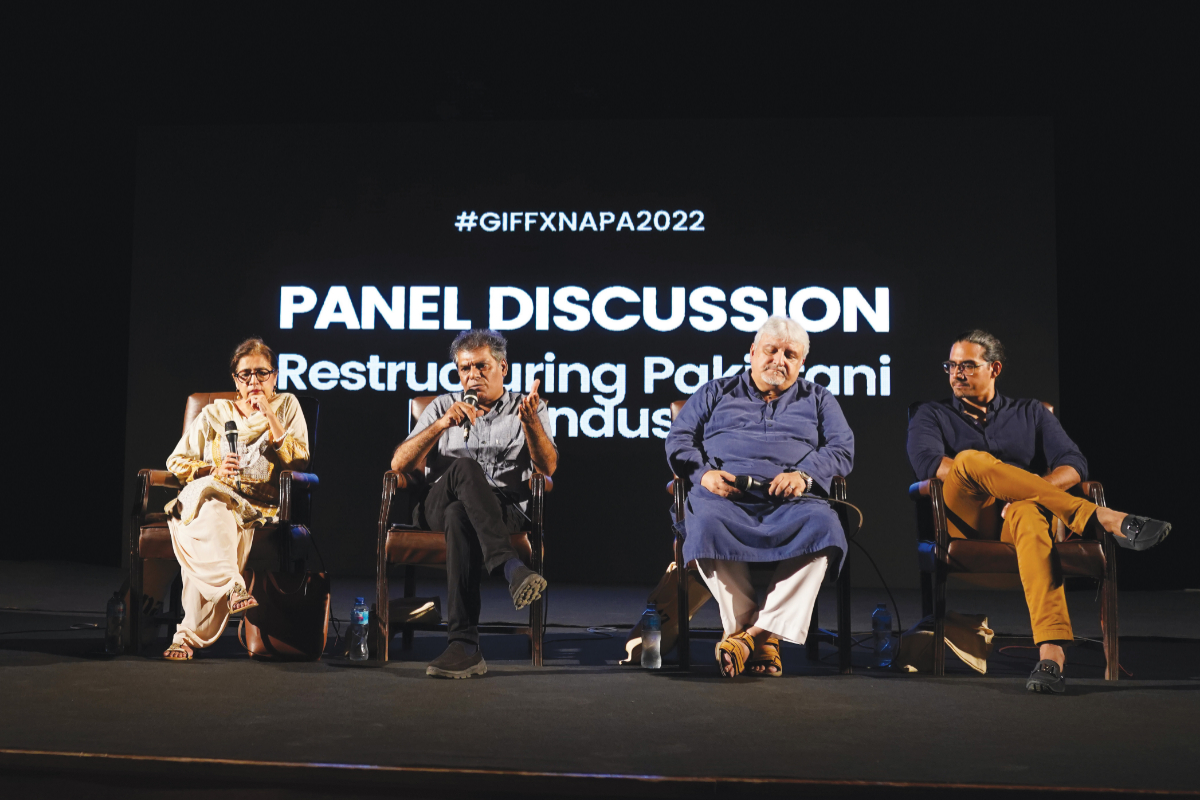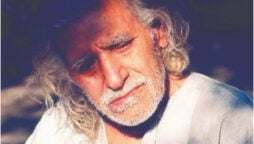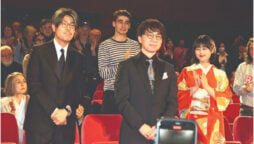
GIFF – An international platform for Pakistani filmmakers
Held in collaboration with NAPA, the Gandhara International Film Festival (GIFF) serves as a reminder of the necessity of quality films.
The 3rd Gandhara Independent Film Festival 2022 (GIFF) recently took place at the National Academy of Performing Arts (NAPA) in Karachi from September 24 to September 25, 2022. Held in collaboration with NAPA, the festival provided a dynamic landscape for budding independent filmmakers, writers, and artistes from the local and international circuits. The festival is known to present a selection of stories that are curated and screened in Pakistan and around the world. The two-day festival was a definite success with a full house on both days. The festival began two years earlier, in 2020, with a vision to drive and exhibit the excellent works that would go unnoticed were it not for such festivals.
Achieving this feat is a small wonder for NAPA as it has been constantly encouraging and ardently supporting richly deserving content, with a critique and analysis of topics deliberated by panellists and moderators belonging to the industry. This allows them to shed light on the craft and the importance of film festivals, the challenges being faced by all the stakeholders involved and the way forward for all of them, along with the audience.

GIFF remains the only platform to showcase the creative expression of independent filmmakers in Pakistan who want to voice their thoughts along with providing entertainment. As the festival discovers award-winning filmmakers to curate immersive and innovative exhibitions, it also, in the process, builds a space for art and storytelling that is not just inspirational but possesses a potent catalyst for change.
This brings us to another dilemma – the dearth of film festivals in Pakistan. Junaid Zuberi, the CEO of NAPA, emphasized the need for such platforms: “The impression of the visuals and screen is powerful, impactful and vocal, without having to say much. This cannot be achieved by an orator speaking for hours to an audience. There are many social disorders that need to be brought to the forefront but are not spoken about, owing to social stigmas around them. These can be easily addressed and exhibited through such forms of creative expression. Although we are primarily a theatre-based organisation, as artists, we feel the need to promote other mediums as well. Because many students graduating from NAPA are working with TV serials, music, films, and many other forms. We have carved a niche and established the theatre as a strong base. But we need to move forward and explore other realms to build the industry at large.”
Kulsoom Aftab, Manager Continuing Education at NAPA, says, “These kinds of platforms are not only a much-needed space for films only. All forms of art must be recognised and acknowledged, whether it is films, theatre, photography, animation, dance, or storytelling since all of these forms enhance each other. With these festivals, I hope to look forward to more original and thought-provoking content emerging from new artistes. We used to have the KARA Film Festival, but the vision needs to take a broader perspective now.”

The stimulating panel discussions featured renowned experts from the industry such as Khalid Anam, Sabiha Sumar, Faris Khalid, and Mohammed Ehteshamuddin, moderated by Omair Alavi on day one of the event. With an insightful discussion about the rise and fall of Pakistani cinema, the talks entailed the challenges the cinema is facing in the country and the way forward to restructure the film industry. Another panel discussion on the same day had Paras Masroor, Vajdaan Shah, Akbar Ladhani, Nigel Bobby, Meesam Naqvi and Saqib Sumeer, moderated by Kulsoom Aftab, which elaborated on contemporary Pakistani films.

The day two of the festival discussed the presence of parallel independent cinema and the role of film festivals. Moderated by Kulsoom Aftab, the panellists, comprising Omair Alavi, Ali Rizvi, Ahsan Bari and Mohsin Ali, expressed their views and convictions cantered on the topic. The talk came to the conclusion that all artistes must build a networking platform to build a community of sorts that would help them assist and leverage each other’s works. All the panel discussions emphasised the importance of a sense of responsibility to present, acknowledge and appreciate meaningful, riveting films, and how it needs to be taught at the grassroots level, beginning from educational institutions, documentary screenings, workshops with industry experts, and master-classes with global filmmakers to capitalise on the collective wisdom and knowledge base to enhance the learning curve for the Pakistani audience.

Expanding on the same conversation, Omair Alavi, an established entertainment journalist, said, “Short-film festivals are important primarily because we can tap new talent and their works get an outreach which they otherwise may not be able to achieve in mainstream cinema. Pakistan has enjoyed festivals in the past. Gradually, they faded away, either because they became commercial, or less genuine. But the revival is required to bring forth unexplored flair which may transcend from short to long formats before they can explore feature films. At GIFF, the films showcased were commendable and I hope to watch more laudable work from Pakistan.” He also recommended the viewers to watch Spider, a film by Nash Edgerton.
The audience liked The Headhunters Daughter by Don Josephus Raphael Eblahan which tells the story of Lynn who travels across the highlands as a country singer. Murder Tongue by Ali Sohail Jaura was another film, which relayed the story of Karachi being in constant upheaval when in 1992 the state-sanctioned “Operation” brought the city to its worst nightmare. Then there was August Sky by Jasmin Tenucci which also won the Cannes Short Film Special Distinction. Bear by Nash Edgerton, an Australian comedy-drama film, also received positive reviews from critics. Trumpets in the Sky by Rakan Mayasi, is a story of a girl named Boushra, born and raised in Tripoli, Lebanon, in the mid-50’s, who begins to dread her childhood. The award-winning films, Letter Room by Elvira Lind (Academy Award for Best Short Film), and Monsters by Frank Tremblay (Best Canadian short film at Rendez Vous Quebec Cinema 2020) were equally mesmeric. Others included The Silent Echo by Suman Sen, The Journey Within by Mian Adnan Ahmad, Deaf (Sorda) by Eva Libertad and Nuria Muñoz-Ortín, Radio by Vipan Malawat, The Hunt by Amy Fajardo, Roberto by Carmen Cardoba and Haru’s New Year by Alice Shin, each compelling and hypnotic in their own right.

Sharing and disseminating art to create a global platform for artistes is a cornerstone principle of NAPA’s initiative and these festivals that go beyond their domain of theatre are proof of their tenacity and belief in an inclusive artistic community. NAPA’s collaboration with GIFF in this historic and unprecedented endeavour serves as a reminder of the necessity of films. -Ends
Catch all the Bold News, Breaking News Event and Latest News Updates on The BOL News
Download The BOL News App to get the Daily News Update & Live News.












 Read the complete story text.
Read the complete story text. Listen to audio of the story.
Listen to audio of the story.